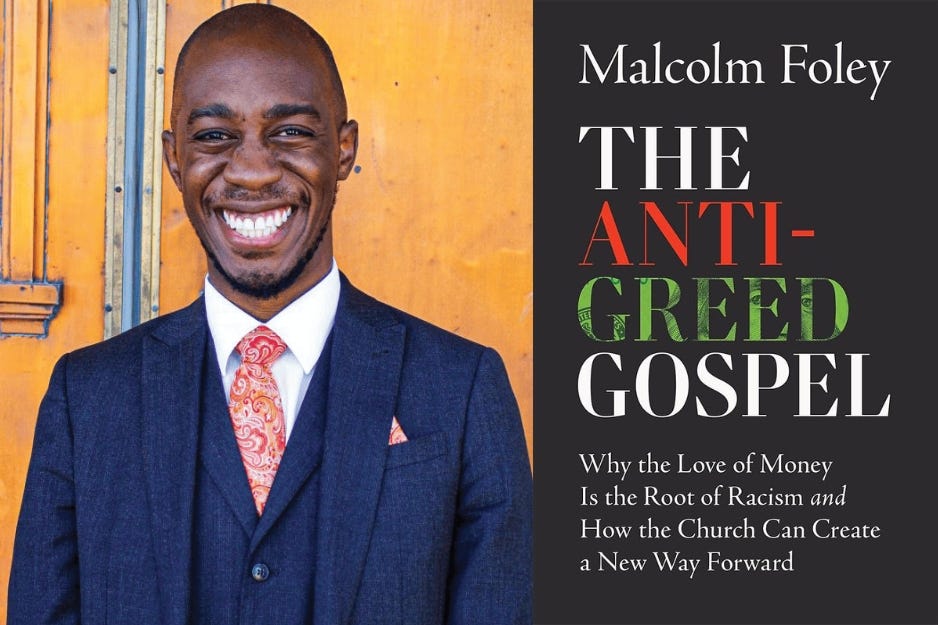Review & Giveaway: The Anti-Greed Gospel
When Brian Kaylor and I set out to write Baptizing America, I feared the book wouldn’t find an audience. Not only did we lambast Christians on the far right for their fusing of religious and national identities, but we focused on the uncomfortable truth that mainline and progressive followers of Jesus deserved a lot of the blame as well. We leveled a critique against our natural allies, leaving few sympathetic audiences left to find the book worthy of their attention.
Apparently Malcolm Foley — pastor, religion scholar, and administrator at Baylor University — suffers from the same contrarian streak … except more extreme. His book The Anti-Greed Gospel: Why the Love of Money Is the Root of Racism and How the Church Can Create a New Way Forward refuses to shy away from controversy. Instead, it makes a bold argument about the ways our historical sins continue to reverberate into the present and how the Church is compelled to respond.
The foundational claim of the book is that racism isn’t rooted in hate or ignorance but in greed. Race is a construct used to violently justify the economic exploitation of others. The desire to accumulate more is the poisonous tree from which the bad fruit of racial hatred has grown.
There’s a clear logic to this argument. Throughout history, the impulse to maximize wealth by some has motivated the subjugation of others. Force becomes a necessary tool to maintain this social order. Justifications about status must be contrived to provide veneers of moral legitimacy.
In the United States, narratives of racial superiority and inferiority were developed to explain slavery and other forms of exploitative labor. The urge to accumulate led to dehumanization, violence, and warped moral thinking. Foley focuses in on the lynchings of Black Americans in the late 19th and early 20th centuries as the paradigmatic example revealing this evil at work.
“Lynch mobs engaged in acts of communal discipline, signaling through terroristic violence how far they would allow Black people to go,” he explains. “Stories about the inferiority of Black people and the sexual savagery of Black men then provided the ballast for assuming that Black labor should be exploited and that Black people should be politically subjugated, and the cycle continued. Greed, violence, and lies danced in a merry-go-round of depravity.”
And don’t be fooled into thinking this is all in the rearview mirror. The racial wealth gap reminds us how the injustices of the past continue to influence the present. Our enduring struggles in the U.S. in areas as diverse as education, policing, mass incarceration, housing, workers’ rights, and poverty can all arguably be interpreted through a racialized logic of exploitation, coercion, and moral justification.
Foley argues that real solutions can’t be found in simply changing hearts and minds. They require altering our political economy by changing how we allocate political power and economic resources. Such a shift isn’t going to come about solely through policy proposals and statistical analysis. It requires something more radical: American Christians taking both the Bible and Jesus a lot more seriously.
In the second half of the book, Foley unpacks Scripture and the Christian tradition’s teaching on wealth and greed, connecting them back to racial injustice. His theological and ethical reflections encourage Christians to replace exploitation with solidarity, to meet violence with love, and to counter lies with truth-telling.
“The kingdom of God is a call to creative rebellion against the powers and principalities,” he concludes at the book’s end. “When the world tells us that violence is the only way, we respond with a vision of a future in which there is only Christ-poured out abundance and a Jesus who has promised us everything we need if we pursue his kingdom first. When the world tells us that actual turning from greed and pride is not possible, we respond with a vision of a world in which all things are made new: you, us, everything.”
I presume Foley didn’t write this book to be provocative, but it’s going to make you uncomfortable. And I’m confident he didn’t share these ideas with the world thinking the masses would rally around them. What’s communicated in its pages is that Foley wants all of us to become better Christians, but he’s clear-eyed about what gets in the way of that happening. He’s seeking to convert us to the path that is anti-greed, anti-racist, and a lot more faithful in how we live in relationship with God and with one another.
Malcolm Foley has agreed to provide one lucky paid reader of A Public Witness with a signed copy of The Anti-Greed Gospel. We don’t mean to be exploitative, but we’re trying to sustain our ministry and would appreciate those who value our content, insights, and book reviews to upgrade their subscriptions today.
As a public witness,
Beau Underwood





The premise of the anti-greed gospel doesn't surprise me -- it has been documented before. Even the venerable musical "1776" about the Declaration of Independence focused a key plot point on slavery. When Thomas Jefferson says he's going to free his slaves, Edward Rutledge of South Carolina responds: "Then you have resolved the ruin of your personal economy." And John Adams replies, "Economy. Always economy." Whereupon Rutledge launches into one of the most soul-searing anthems of the play, "Molasses to Rum" about the triangle trade. The lyrics refer to ships carrying "Bibles and slaves." See the clip on YouTube at https://youtu.be/IeuaTpH6Ck0?si=Br65Zv1m4He0MrDu
PS The actor who plays Edward Ruledge is John Cullum, who later portrayed Holling Vincour in "Northern Exposure."